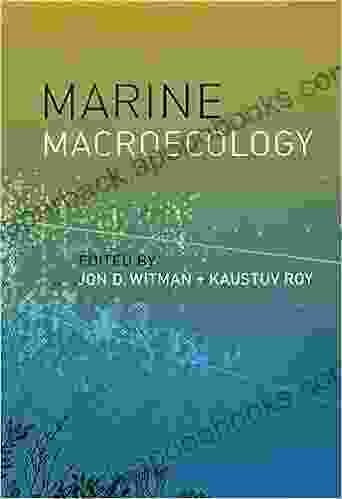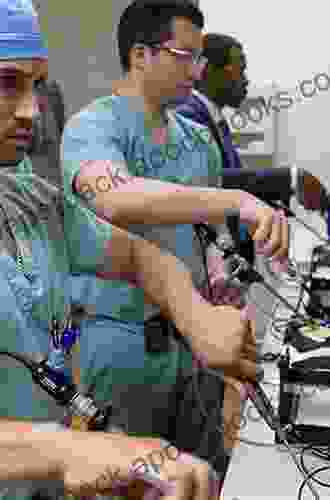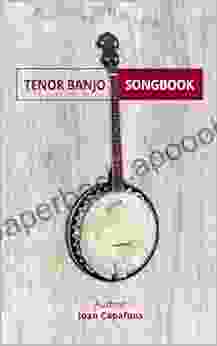Marine Macroecology: A Comprehensive Guide to the Study of Large-Scale Patterns in the Marine Environment

By Jennie Rooney
Marine Macroecology is the study of large-scale patterns and processes in the marine environment. It is a relatively new field, but it has quickly become one of the most important areas of marine research. This is because large-scale patterns and processes can have a profound impact on the distribution and abundance of marine organisms, and on the functioning of marine ecosystems.
4.3 out of 5
| Language | : | English |
| File size | : | 5321 KB |
| Text-to-Speech | : | Enabled |
| Screen Reader | : | Supported |
| Print length | : | 440 pages |
| Lending | : | Enabled |
History of Marine Macroecology
The history of marine macroecology can be traced back to the early days of oceanography. However, it was not until the late 19th century that scientists began to seriously study large-scale patterns in the marine environment. One of the pioneers of marine macroecology was Alexander von Humboldt, who conducted a series of expeditions to the Americas and the Pacific Ocean. Humboldt's work helped to lay the foundation for the field of biogeography, which is the study of the distribution of organisms.
In the early 20th century, marine macroecology was further developed by scientists such as Victor Hensen and Carl Chun. Hensen conducted a series of plankton surveys in the North Sea, and Chun explored the deep sea. Their work helped to provide a better understanding of the distribution and abundance of marine organisms.
In the mid-20th century, marine macroecology began to take on a more quantitative approach. This was due in part to the development of new statistical techniques. As a result, marine macroecologists were able to begin to identify and quantify the large-scale patterns and processes that shape the marine environment.
In the late 20th and early 21st centuries, marine macroecology has continued to develop as a field. New technologies, such as remote sensing and GIS, have allowed marine macroecologists to study large-scale patterns and processes in unprecedented detail. As a result, our understanding of the marine environment has increased dramatically.
Approaches to Studying Marine Macroecology
There are a variety of approaches that can be used to study marine macroecology. These approaches include:
* Observational studies: Observational studies involve collecting data on the distribution and abundance of marine organisms. This data can be used to identify large-scale patterns and processes. * Experimental studies: Experimental studies involve manipulating the environment to study the effects on marine organisms. This type of study can be used to test hypotheses about the processes that shape the marine environment. * Modeling studies: Modeling studies involve creating mathematical models to simulate the marine environment. These models can be used to investigate the effects of different factors on the distribution and abundance of marine organisms.
Major Patterns and Processes in Marine Macroecology
Marine macroecologists have identified a number of large-scale patterns and processes that shape the marine environment. These patterns and processes include:
* Latitudinal gradients: Latitudinal gradients are patterns in the distribution and abundance of marine organisms that vary with latitude. For example, the diversity of marine organisms tends to decrease towards the poles. * Depth gradients: Depth gradients are patterns in the distribution and abundance of marine organisms that vary with depth. For example, the pressure and temperature of the water change with depth, and these changes can affect the distribution and abundance of marine organisms. * Biogeographic provinces: Biogeographic provinces are regions of the ocean that have distinct assemblages of marine organisms. These provinces are often separated by physical barriers, such as ocean currents or landmasses. * Food webs: Food webs are the interconnected food chains that exist within an ecosystem. Marine food webs are typically complex, and they can have a significant impact on the distribution and abundance of marine organisms. * Climate change: Climate change is a major threat to marine ecosystems. Climate change can affect the distribution and abundance of marine organisms, and it can also disrupt food webs.
Marine Macroecology is a rapidly growing field that is providing new insights into the functioning of the marine environment. This field is essential for understanding the impacts of human activities on the marine environment, and for developing strategies to protect and conserve marine ecosystems.
References
* [1] Begon, M., Townsend, C. R., & Harper, J. L. (2006). Ecology: From individuals to ecosystems (4th ed.). Blackwell Publishing. * [2] Brown, J. H., & Lomolino, M. V. (1998). Biogeography (2nd ed.). Sinauer Associates. * [3] Gaston, K. J. (2003). The structure and dynamics of geographic ranges. Oxford University Press. * [4] Hubbell, S. P. (2001). The unified neutral theory of biodiversity and biogeography (MPB-32). Princeton University Press. * [5] MacArthur, R. H., & Wilson, E. O. (1967). The theory of island biogeography. Princeton University Press.
4.3 out of 5
| Language | : | English |
| File size | : | 5321 KB |
| Text-to-Speech | : | Enabled |
| Screen Reader | : | Supported |
| Print length | : | 440 pages |
| Lending | : | Enabled |
Do you want to contribute by writing guest posts on this blog?
Please contact us and send us a resume of previous articles that you have written.
 Book
Book Novel
Novel Page
Page Chapter
Chapter Text
Text Story
Story Genre
Genre Reader
Reader Library
Library Paperback
Paperback E-book
E-book Magazine
Magazine Newspaper
Newspaper Paragraph
Paragraph Sentence
Sentence Bookmark
Bookmark Shelf
Shelf Glossary
Glossary Bibliography
Bibliography Foreword
Foreword Preface
Preface Synopsis
Synopsis Annotation
Annotation Footnote
Footnote Manuscript
Manuscript Scroll
Scroll Codex
Codex Tome
Tome Bestseller
Bestseller Classics
Classics Library card
Library card Narrative
Narrative Biography
Biography Autobiography
Autobiography Memoir
Memoir Reference
Reference Encyclopedia
Encyclopedia Jesper Sehested
Jesper Sehested Joann Tuzeo Jarolmen
Joann Tuzeo Jarolmen Luke Rosiak
Luke Rosiak Michael A Figueroa
Michael A Figueroa Liam Mccann
Liam Mccann Gerard Aching
Gerard Aching Jennifer Palmieri
Jennifer Palmieri Mike Oldfield
Mike Oldfield Marie B Trout
Marie B Trout Paul Laurence Dunbar
Paul Laurence Dunbar Johann Peter Eckermann
Johann Peter Eckermann Mary Lefkowitz
Mary Lefkowitz Shyam Selvadurai
Shyam Selvadurai Joann Bortles
Joann Bortles Jim Ruland
Jim Ruland Mark Graph
Mark Graph M F Soriano
M F Soriano Jeremy Fisher
Jeremy Fisher Lillian Olson
Lillian Olson Will Brooker
Will Brooker
Light bulbAdvertise smarter! Our strategic ad space ensures maximum exposure. Reserve your spot today!

 Dan HendersonUnveiling the Blueprint for Transformative Public Education: Empowering Black...
Dan HendersonUnveiling the Blueprint for Transformative Public Education: Empowering Black... Kazuo IshiguroFollow ·13.5k
Kazuo IshiguroFollow ·13.5k Ryūnosuke AkutagawaFollow ·6.7k
Ryūnosuke AkutagawaFollow ·6.7k Drew BellFollow ·6.5k
Drew BellFollow ·6.5k Terence NelsonFollow ·13.5k
Terence NelsonFollow ·13.5k Jayson PowellFollow ·19.8k
Jayson PowellFollow ·19.8k W.B. YeatsFollow ·12.4k
W.B. YeatsFollow ·12.4k Leo MitchellFollow ·14.3k
Leo MitchellFollow ·14.3k Felix CarterFollow ·5.3k
Felix CarterFollow ·5.3k

 Preston Simmons
Preston SimmonsEmbark on a Literary Odyssey with "Walking on Water": A...
Prepare to be swept...
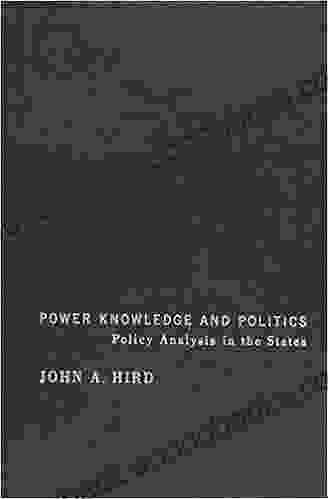
 Ernesto Sabato
Ernesto SabatoUnlocking Policy Analysis: Dive into the Intricacies of...
: The Realm of Policy...
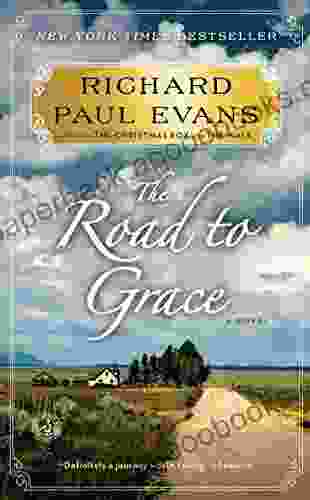
 Forrest Reed
Forrest ReedThe Road to Grace Walk: A Journey of Spiritual Growth and...
In the tapestry of life, we...

 Evan Simmons
Evan SimmonsTip Neill and the Democratic Century: A Political Odyssey...
The Rise of a Political Giant In the...

 Mark Mitchell
Mark MitchellUnwrap the Magic: A Review of Christmas Memory by Richard...
As the cold winter months draw near, and...
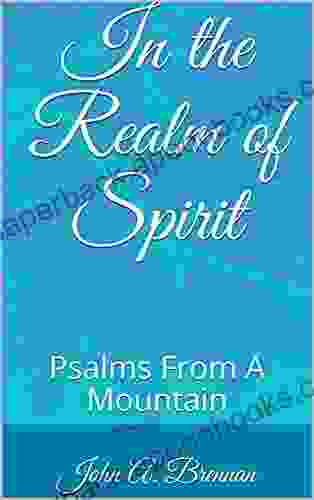
 Percy Bysshe Shelley
Percy Bysshe ShelleyBeyond the Veil: Delve into the Realm of Spirit with In...
Unveiling the Mysteries of the Unseen...
4.3 out of 5
| Language | : | English |
| File size | : | 5321 KB |
| Text-to-Speech | : | Enabled |
| Screen Reader | : | Supported |
| Print length | : | 440 pages |
| Lending | : | Enabled |


